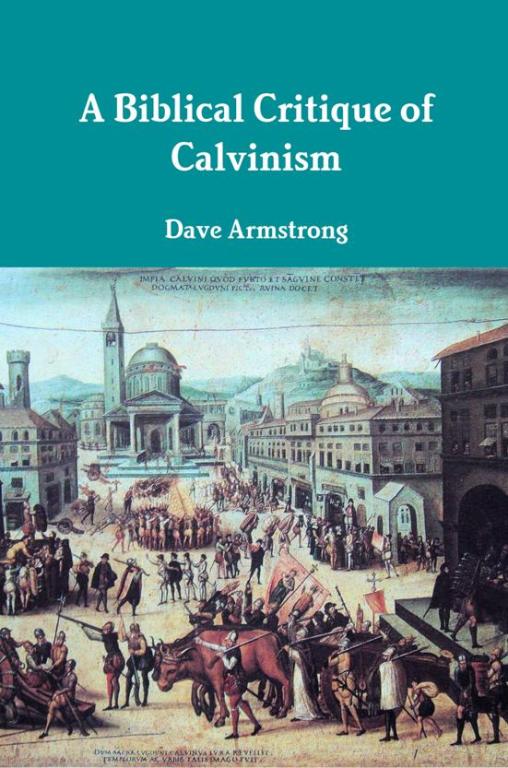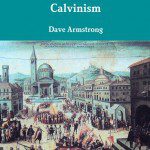***
[portion of my book, A Biblical Critique of Calvinism]
***
They endeavor, indeed, to disentangle themselves, but it is impossible. They pretend a distinction between penalty and guilt, holding that the guilt is forgiven by the mercy of God; but that though the guilt is remitted, the punishment which divine justice requires to be paid remains. Satisfactions then properly relate to the remission of the penalty. How ridiculous this levity! They now confess that the remission of guilt is gratuitous; and yet they are ever and anon telling as to merit it by prayers and tears, and other preparations of every kind. Still the whole doctrine of Scripture regarding the remission of sins is diametrically opposed to that distinction. But although I think I have already done more than enough to establish this, I will subjoin some other passages, by which these slippery snakes will be so caught as to be afterwards unable to writhe even the tip of their tail: “Behold, the days come, saith the Lord, that I will make a new covenant with the house of Israel, and with the house of Judah.” “I will forgive their iniquity, and I will remember their sin no more,” (Jer. 31:31, 34). What this means we learn from another Prophet, when the Lord says, “When the righteous turneth away from his righteousness” “all his righteousness that he has done shall not be mentioned.” “Again, when the wicked man turneth away from his wickedness that he has committed, and does that which is lawful and right, he shall save his soul alive,” (Ezek. 18:24, 27). When he declares that he will not remember righteousness, the meaning is, that he will take no account of it to reward it. In the same way, not to remember sins is not to bring them to punishment. The same thing is denoted in other passages, by casting them behind his back, blotting them out as a cloud, casting them into the depths of the sea, not imputing them, hiding them. By such forms of expression the Holy Spirit has explained his meaning not obscurely, if we would lend a willing ear. Certainly if God punishes sins, he imputes them; if he avenges, he remembers; if he brings them to judgment, he has not hid them; if he examines, he has not cast them behind his back; if he investigates, he has not blotted them out like a cloud; if he exposes them, he has not thrown them into the depths of the sea. (Institutes, III, 4:29)
*
What, pray, did Christ perform for us if the punishment of sin is still exacted? For when we say that he “bare our sins in his own body on the tree,” (1 Pet. 2:24), all we mean is, that he endured the penalty and punishment which was due to our sins. This is more significantly declared by Isaiah, when he says that the “chastisement (or correction) of our peace was upon him,” (Isaiah 53:5). But what is the correction of our peace, unless it be the punishment due to our sins, and to be paid by us before we could be reconciled to God, had he not become our substitute? Thus you clearly see that Christ bore the punishment of sin that he might thereby exempt his people from it. . . . The passages which we have quoted above say expressly that the terms on which God receives us into favor are these—viz. he remits all the punishment which we deserved by pardoning our guilt. . . . In short, if we are freed from guilt by Christ, the punishment consequent upon guilt must cease with it. (III, 4:30)
Since Calvin wants to cite a lot of Old Testament passages in this portion of his work, I will cite three that contradict his erroneous and characteristically too-sweeping interpretation of what he presents. These show that sometimes temporal punishment or chastisement still occurs after God has forgiven or pardoned:
Numbers 14:17-24 [RSV] And now, I pray thee, let the power of the LORD be great as thou hast promised, saying, [18] `The LORD is slow to anger, and abounding in steadfast love, forgiving iniquity and transgression, but he will by no means clear the guilty, visiting the iniquity of fathers upon children, upon the third and upon the fourth generation.’ [19] Pardon the iniquity of this people, I pray thee, according to the greatness of thy steadfast love, and according as thou hast forgiven this people, from Egypt even until now.” [20] Then the LORD said, “I have pardoned, according to your word; [21] but truly, as I live, and as all the earth shall be filled with the glory of the LORD, [22] none of the men who have seen my glory and my signs which I wrought in Egypt and in the wilderness, and yet have put me to the proof these ten times and have not hearkened to my voice, [23] shall see the land which I swore to give to their fathers; and none of those who despised me shall see it. [24] But my servant Caleb, because he has a different spirit and has followed me fully, I will bring into the land into which he went, and his descendants shall possess it.
Deuteronomy 32:48-52 And the LORD said to Moses that very day, [49] “Ascend this mountain of the Ab’arim, Mount Nebo, which is in the land of Moab, opposite Jericho; and view the land of Canaan, which I give to the people of Israel for a possession; [50] and die on the mountain which you ascend, and be gathered to your people, as Aaron your brother died in Mount Hor and was gathered to his people; [51] because you broke faith with me in the midst of the people of Israel at the waters of Mer’i-bath-ka’desh, in the wilderness of Zin; because you did not revere me as holy in the midst of the people of Israel. [52] For you shall see the land before you; but you shall not go there, into the land which I give to the people of Israel.” (cf. Num 20:10-12)
2 Samuel 12:13-14 David said to Nathan, “I have sinned against the LORD.” And Nathan said to David, “The LORD also has put away your sin; you shall not die. [14] Nevertheless, because by this deed you have utterly scorned the LORD, the child that is born to you shall die.” (cf. ch. 24)
Oddly enough, after his statements above that go too far and bring him in conflict with Scripture, Calvin becomes much more nuanced and “arrives” at a view not unlike the Catholic one in these matters of penance and chastisement:
Had they observed, what certainly they ought not to have overlooked, that there are two kinds of divine judgment, they would have seen in the correction of David a very different form of punishment from that which must be thought designed for vengeance. . . . For the sake of distinction, we may call the one kind of judgment punishment, the other chastisement. . . . By divine punishment, properly so called, let us then understand punishment accompanied with indignation. In judicial chastisement, he is offended, but not in wrath; he does not punish by destroying or striking down as with a thunderbolt. Hence it is not properly punishment or vengeance, but correction and admonition. The one is the act of a judge, the other of a father. When the judge punishes a criminal, he animadverts upon the crime, and demands the penalty. When a father corrects his son sharply, it is not to mulct or avenge, but rather to teach him, and make him more cautious for the future. (III, 4:31)
We Catholics are well aware of this rather obvious scriptural distinction, and Calvin was smart enough to realize and grasp this. He even treats one of the most compelling Catholic prooftexts in this regard: King David’s case (2 Samuel 12:13-14 above) at some length:
The sons of God are beaten with rods, not that they may pay the punishment due to their faults, but that they may thereby be led to repent. . . . Thus, when he rejected Saul from the kingdoms he punished in vengeance (1 Sam. 15:23); when he deprived David of his child, he chastised for amendment (2 Sam. 12:18). (III, 4:33)
All, if I mistake not, now see what view the Lord had in chastening David, namely, to prove that murder and adultery are most offensive to God, and to manifest this offensiveness in a beloved and faithful servant, that David himself might be taught never again to dare to commit such wickedness; still, however, it was not a punishment designed in payment of a kind of compensation to God. In the same way are we to judge of that other correction, in which the Lord subjects his people to a grievous pestilence, for the disobedience of David in forgetting himself so far as to number the people. He indeed freely forgave David the guilt of his sin; but because it was necessary, both as a public example to all ages and also to humble David himself, not to allow such an offense to go unpunished, he chastened him most sharply with his whip. We ought also to keep this in view in the universal curse of the human race. For since after obtaining grace we still continue to endure the miseries denounced to our first parent as the penalty of transgression, we ought thereby to be reminded, how offensive to God is the transgression of his law, that thus humbled and dejected by a consciousness of our wretched condition, we may aspire more ardently to true happiness. (III, 4:35)
Frustratingly, often when Calvin expresses a view that is scarcely different from the Catholic perspective, he doesn’t realize it, and continues to think that Catholics believe something fundamentally different. Sadly, this is a general tendency in historic Protestant exegesis and dogmatic theology. Frequently, Calvin prefers to war against a straw man of his own making, rather than admit agreement with Catholics.
In this instance (analyzing his treatment of David’s punishment), arguably it is a case of a “distinction without a difference.” Calvin wants to split hairs and call this “chastisement” rather than “temporal punishment.” That’s fine, but it is what it is, whatever one calls it, and Catholics conceptually agree with him, for the most part. Our “temporal punishment” or “satisfaction” or (more broadly) “penance” is roughly the same as what he (and we) would call “chastisement.”
But Calvin, wishing to always paint Catholicism in the worst light, and missing many relevant distinctions in Catholic theology, caricatures our position on penance as equivalent to divine wrath or vengeance, which is properly applied only to reprobates, on their way to hell. Nice try, but no cigar . . .














